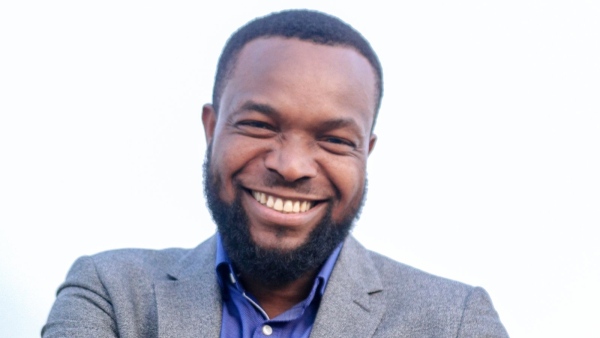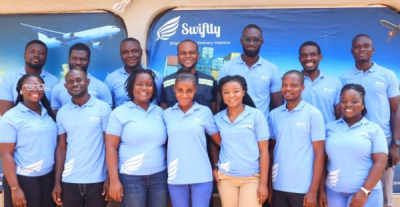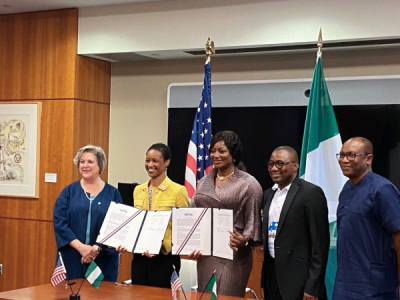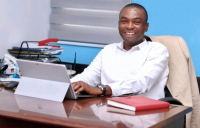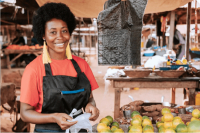Access to medicines sometimes proves challenging in Africa, leading tech entrepreneurs to develop innovative solutions to address the various issues.
Phati is an e-health solution developed by Congolese start-up Valorigo, founded in 2018. It helps users check whether health products are available in their neighborhoods, compare prices, and get directions to the most appropriate pharmacies.
Users can access the solution through its web platform and contact chosen pharmacies on Whatsapp. Indeed, when looking for specific health products, they just have to visit the Phati web platform and input their location and the name of the product. They will then get redirected to a page listing the pharmacies selling products, their prices, and contact details. Once the user selects a pharmacy to buy from, he/she is redirected to WhatsApp to complete the acquisition.
To be listed on Phati, pharmacies have to register by providing their name, address, and contact details. Apart from Phati, Valorigo has developed several other e-health solutions.
In September 2022, it was selected as one of the 30 healthtech startups that will participate in the pan-African program Investing in Innovation (i3).
Adoni Conrad Quenum
He currently heads one of Africa’s leading incubators and accelerators. From day one, his ambition has always been to contribute to the development of tech innovation on the continent. That ambition is still the same twenty years on.
Bosun Tijani (photo) is a Nigerian entrepreneur, innovation expert, and researcher. He is also the co-founder and CEO of Co-creation Hub Nigeria (CcHUB), a tech lab and startup pre-incubation and acceleration space based in Lagos.
“[..] For everything we do, we put a strong emphasis on innovation and how to build an innovation ecosystem that allows knowledge to be at the heart of how we solve problems. We call ourselves the social innovation center that is focused on accelerating the application of social capital and technology,” the CEO said in 2021, explaining the CcHUB’s DNA.
Since the creation of the CcHUB in 2010, he has spurred the development of several socially impactful initiatives, including its VC fund Growth Capital, the Make-IT Accelerator, and the Giving4Good Challenge that aims to build innovative mobile platforms to facilitate philanthropic donations.
Over the years, Bosun Tijani has managed to attract the support of major technology companies and institutions. They include Google which, alongside the Rwandan Ministry of ICT and Innovation and the Mojaloop Foundation, is supporting the CcHUB’s Fintech Innovation Program in Rwanda.
Since February 2022, he is the board chair of healthtech startup LifeBank. He is also an adjunct research fellow at the Nigerian Institute of Medical Research, since 2018. In 2014, he founded Truppr, a social fitness platform, after almost a decade of a professional career, which started as the national director of the non-profit organization AIESEC in 1998.
In 2003, he joined DeliveryKing as the business development manager and, one year later, he was hired as the Deployment Lead (Africa) for Hewlett Packard (HP) Global Micro-enterprises Acceleration Programme (GMEAP).
From 2005 to 2007, he was the International Trade Center’s Consultant in Internet and Communication Technologies. Later on, he joined English business services and consulting company Pera as head of the European research network until 2010, when he founded CcHUB.
In 2021, the New African Magazine named him one of the 100 most influential individuals in Africa and awarded him the Global icon of African excellence Award. He is also on We Are Tech’s 2022 list of the 50 individuals shaping the African tech industry.
Melchior Koba
The social network is not his first experience as a tech entrepreneur. He has already distinguished himself in the ecommerce sector in his country. With BluePix, he wants to highlight the Malagasy youth.
Herimanana Rasolonirina (photo) is a Malagasy student taking the NEOMA Business School’s innovative and creative program TEMA, in France, since 2021. In March 2022, he created BluePix, the first social network dedicated to young Malagasies.
“I got the idea to create BluePix when I arrived in France and discovered how little known Madagascar is to some, but also that it is often linked to DreamWorks’ cartoon ‘Madagascar’ which is not at all representative of the country. We don’t have penguins or lions in Madagascar. It's time for Madagascar and its youth to shine,” he said during an interview with French media Planète Grandes Ecoles in March 2022.
Like Facebook and other social networks, BluePix is created to facilitate socialization. However, it frowns on divisive subjects like politics, Herimanana Rasolonirina stressed. To encourage the Malagasy youth, he devised a remuneration system for content creators, as most networks do. He also plans to set up a “student deals and discounts” project in his native country.
In October 2022, BluePix launched an application programming interface (API) thanks to which the social network can be used to quickly log in or register on other platforms. The startup also announced a new feature that allows users to post and apply for internship opportunities.
The social network, which already boasts more than 5,000 users, is not Herimanana Rasolonirina’s first venture. Earlier in Madagascar, he founded HelloGames Madagascar, a platform that sells digital products like games, software, etc.
Melchior Koba
The solution was developed to, among other things, ease access to health products for the more than 50% of French-speaking African patients who are still buying drugs on street corners.
Meditect is an e-health solution developed by an Ivorian eponymous start-up. It allows access to quality health products, helps locate the nearest pharmacies, and verifies the authenticity of products they purchase. The start-up, founded in 2018 by Arnaud Pourredon and Romain Renard, aims to digitalize the drug distribution chain in Côte d'Ivoire.
According to Arnaud Pourredon, Meditect was created to help Africa, which is experiencing an unprecedented demographic explosion, address challenges preventing access to quality medicines with digitalization.
Thanks to its mobile app -available for Android and iOS devices, the solution helps users access information on the health products they are prescribed. Provided they are logged in or signed in, they can easily check the prices of the products and the pharmacies where they are available.
The solution also requires pharmacists to create accounts before submitting their pharmacies. To avoid data loss in case of unforeseen events, the startup stores data both locally and on the cloud. Currently, it operates in Senegal and Côte d’Ivoire, claiming more than 50,000 patients and 1,200 pharmacies. It also partners with local and customs authorities to combat counterfeit drugs. It has for instance helped seize more than 3,000 drugs. Play Store data show its Android app has been downloaded more than 10,000 times. In September 2022, the healthtech startup was selected to take part in the pan-African Investing in Innovation (i3).
Adoni Conrad Quenum
The solution created in Ghana to facilitate freight transport across Africa has now taken on the international scene.
Swiftly is a digital solution developed by a Ghanaian eponymous startup founded in 2016. It allows its users -namely freight forwarders and traders- access to freight quotes and expert advice on customs regulations, and ships goods worldwide.
To use the solution, users have to visit its web platform and fill out a form with their freight details to get quotes from the startup’s network of freight forwarders. They can thus select the best quote, make payment online and wait for the freight to be delivered.
Air freights usually take between three and five working days against 30-40 days for sea freight and 1-2 days for road freights. For usual courier services, the delivery time is usually below three hours.
Let’s note that to get quotes and order freight or courier services, users will have to create their Swiftly accounts by providing personal information like name, surname, email, phone number, etc. Using their Swiftly accounts, users can also negotiate with other Swiftly users to co-lease containers for their shipments.
“It is a waste of space when someone has to ship a half-full container by sea, a half-full package by air, or hire a delivery service without fully utilizing the space in there. We aim to solve that by linking shippers to each other for them to share their extra space. Others also wish they could find someone to collaborate with to load a shipment, we are the matching platform for such people,” explained Swiftly co-founder Edem Dotse.
The startup, which claims rates up to 30% lower than the competition, went from shipping just 100 kilograms yearly to 500 tons monthly. According to Edem Dotse, it already ships goods from all over the world to countries like Ghana, South Africa, Burkina Faso, Kenya, Rwanda, Nigeria, the UK, the USA, Canada, Australia, and China.
Its plan is now to establish a physical presence in French-speaking West Africa, and East Africa. It also plans to introduce its business model in the United States, China, and Europe.
Adoni Conrad Quenum
For the past 18 months, Nigerian healthcare provider Mobihealth has been working with the Bill and Melinda Gates Foundation in select states in Nigeria. The additional capital will allow the startup to expand outside Nigeria.
The U.S. Trade and Development Agency (USTDA) announced Monday, Oct. 17, a grant to Nigeria's Mobihealthcare Limited (Mobihealth) for a feasibility study to support the development of its telehealth services in Côte d'Ivoire, Ghana, Kenya, and Egypt.
According to USTDA’s director Enoh T. Ebong, the partnership aims to “transform the delivery of healthcare to underserved communities across Africa using the best technology that the U.S. industry has to offer.”
It is “gratifying to see women-led businesses such as Mobihealth leading the development of critical infrastructure on the continent,” he added.
While the amount of the grant was not disclosed, the statement said the study would include a detailed market assessment, financial analysis, and legal and regulatory review for each of the four countries. The Africa Investment Forum (AIF), an initiative by the African Development Bank, will work with USTDA to facilitate the development and financing of the Mobihealth project.
A year ago, USTDA signed a memorandum of understanding with AIF to support high-quality infrastructure solutions for sub-Saharan Africa. The MoU defined cooperation areas in vital sectors such as clean energy, transportation, information and communication technology, health infrastructure, and agribusiness.
According to the USTDA release, the “project also advances the U.S. government’s Prosper Africa initiative to substantially increase two-way trade and investment between the United States and Africa.” It will help expand access to health care for 100,000 people per year in Africa.
For Mobihealth CEO, Funmi Adewara, “the USTDA grant comes at an opportune time and will enable us to expand the scope of our integrated telehealth, electronic medical records, and digitalization services to several other African markets over the next few years.”
Samira Njoya
By partnering with Pando DAO, Zanzibar wants to maximize its chances of becoming a leading industrial hub in Africa and a model of the digital economy.
Pando DAO, an African community of leading start-up founders, announced, Monday (October 17), its partnership with Silicon Zanzibar, a government initiative launched earlier this year to attract tech talents and companies.
According to Mudrick Soraga, Zanzibar's Minister of Investment and Economic Development, the partnership is important to ensure the success of the Silicon Zanzibar project. "We are excited to officially partner with Pando to co-create the policies and initiatives that will transform Zanzibar’s economy. Working with Pando DAO presents us an opportunity to work side-by-side with the leading players in the African tech ecosystem,” he said.
The first initiatives of the partnership will include the creation of an open hub for Pando DAO members and a Pando CEO Summit, which will be launched later this year. The community will also assist the Zanzibar government in developing a regulatory and policy framework that will support innovation and its digital economy, including a strategy to ensure the development of local tech talent.
The partnership with Pando DAO is highly beneficial for Zanzibar which wants to become a leading hub for pan-African tech companies. Indeed, through Pando Dao, the government is partnering with over 50 African tech startup founders, including founders of well-known startups like mPharma, Wasoko, Pariti, SunCulture, and Africa Health Holdings among others. The overall valuation of Pando DAO’s member startups is over US$2 billion with more than US$500 million raised. The startups employ over 10,000 people in 15 African countries.
According to Pando DAO co-founder and Pariti CEO Yacob Berhane, Pando DAO member companies will be supported, by the government, in their efforts to relocate to the archipelago. “We believe that through this partnership, we will be able to drive the tech ecosystem in Africa forward, with Zanzibar serving as a key part of that story by attracting tech companies and talent, and developing homegrown companies and talent as well,” he said.
Samira Njoya
The trained physician is a tech enthusiast and serial entrepreneur. From 2011 to date, he has founded three healthtech ventures.
Dennis Addo (photo) is a Ghanaian physician and entrepreneur. He is also the founder and CEO of health tech start-up Wala Digital Health, which he launched in 2019.
His startup, which was selected for the regional stage of the MEST Africa Challenge 2022, aims to facilitate hospitals’ access to blood products during medical emergencies. For that purpose, it developed a digital platform allowing hospitals and blood banks to order blood products and get them delivered.
The CEO, who is committed to the healthtech sector, is also the founder of Clarondoc, an online platform connecting Africans with health professionals since its launch in 2018. He is also the founder and CEO of Claron Health International, a health maintenance organization founded in 2011.
Apart from his entrepreneurial career, he has had a professional career boasting positions at national and national institutions. He started, in 2007, as a public health consultant and project manager at the Ghanaian Defense Ministry’s health directorate. About six years later, he was hired by the UN as a senior medical officer for missions in Côte d’Ivoire. From March to September 2020, he was a member of the global implementation team of the citizen-centric movement Covid Safe Paths.
Currently, he is a member of the board of the Ghanaian National Health Insurance Authority.
Melchior Koba
The ongoing technological revolution has affected every economic sector, including the informal ones. Sabi is one of those solutions developed to solve some of the problems faced by those informal sectors.
Sabi is a B2B platform developed by a Nigerian eponymous startup, founded in 2020. It allows informal traders to seamlessly conduct business transactions.
Its services are accessible via an Android and iOS app. Using the app, informal traders can create their accounts, connect with other registered merchants and easily conduct business and get products delivered if needed.
The platform also allows informal traders to monitor their sales and get performance reports. It even allows access to loans to help traders recover from major problems. “Sabi ensures Merchants are allowed to grow and increase their revenue with services such as loans and access to the best product prices in the market,” its website explains.
It claims over 10,000 agents across Nigeria, with 200,000 merchants registered and over US$2 billion in sales. Play Store data show its Android app has been downloaded more than 10,000 times. The startup, which is also present in Kenya, wants to scale into other African countries in the coming years. For that purpose, in 2021, it raised US$6 million to support its growth.
Adoni Conrad Quenum
The new laboratory is the result of a joint project implemented by the ECOWAS Commission and the European Union to improve cybersecurity and cybercrime combating capabilities in West Africa.
Today, October 19, in Banjul, the ECOWAS commission is scheduled to officially hand over a digital lab, for the fight against cybercrime, to the Gambia.
Officially, the lab will strengthen the country’s digital forensic and investigation capabilities. “By handing over this brand new laboratory to the Gambian authorities, ECOWAS and its partners wish to build the capacity of the Gambian police to effectively counter cybercrime in the country and to better cooperate with the other Member States in terms of managing cybercrime problems,” a release dated October 18, 2022, informs.
The lab, funded by the European Union and ECOWAS, is equipped with state-of-the-art equipment, including forensic equipment (forensic duplicator and imager, forensic laptops, forensic workstation/server, etc.), generic hardware, software, and licenses.
In recent years, The Gambia has been plagued by the continuing rise of cybercrime. In 2020, the country faced a series of cyber incidents, including attacks on financial institutions, revenge pornography, and the publication of nude pictures on the Internet. Despite the measures taken by the government, cybercriminals are not backing down. According to Interpol's October 21, 2021 report on key cyber threats in Africa, the majority (60%) of the actors carrying out global False International Bank Transfers (FOVI) are based in eleven African countries, including the Gambia (which accounts for less than 1%).
To address these cybersecurity and cybercrime issues, foster cooperation between states, and take part in the implementation of the ECOWAS cybersecurity agenda, the European Union and the ECOWAS Commission have joined forces around the "Organised Crime: West African response to Cybersecurity and fight against Cybercrime" (OCWAR-C) project. The Gambia’s digital forensic lab is an offshoot of the project.
In March 2021, under the same project, equipment was handed to the Burkina Faso Central Brigade for the Fight against Cybercrime (BCLCC)’s digital investigation laboratory. Also, cybersecurity training and awareness campaigns were recently organized to strengthen ECOWAS member countries’ capacities to fight cybercrimes.
Samira Njoya
More...
Gabon is currently implementing several e-learning projects to empower learners and facilitate distance learning.
Gabon recently crossed a new milestone in its digital university project UNG. Last October 13, the draft law on its creation, missions, and management was adopted during the Ministerial Council in Libreville.
According to a communique published after the council, the UNG will develop and popularize digitalization in the Gabonese education system. It will also support higher education and research institutions in the development of online training courses -the creation of digital education material notably- and promote entrepreneurship and digital innovation.
In Gabon, as almost everywhere in the world, the education system was disrupted by the coronavirus pandemic. The country quickly adopted new approaches by mostly including digital tools. The UNG will therefore set up digital spaces functioning like regional academic centers dedicated to blended university learning (distance and physical learning) in provincial capitals.
On its website, the UNG informs that its training is partially remote. It has a platform that allows students to access educational resources and online documentation, but also webinars and digital workspaces. Face-to-face meetings are scheduled for tutorials, assessments, and socialization.
The three-year training program will give graduates the opportunity to work in a wide range of e-services professions. Every UNG student will take an entrepreneurship course with insertion in e-incubators, to boost their ability to create innovative companies for socio-economic development.
Samira Njoya
The Algerian government has decided to leverage digital technologies to solve the country's transport issues. Last month, the Minister of Transport announced the launch of a new electronic platform interconnecting more than 40 public transport services.
Algeria’s Minister of Higher Education Kamel Baddari announced, yesterday, the launch of “MyBus”, a mobile app developed to allow students to monitor the university transport network in real-time.
The application -operational starting from October 23, 2022,- is a modern tool that aims “to improve the quality of university services [...] to create a conducive academic environment for students,” the Transport Minister said before the national assembly’s transport committee.
Since 2009, students have been complaining about mobility conditions, including disruption in university bus schedules and a serious lack of buses in some areas. Last April, a group of students enrolled at the University of Mouloud-Mammeri demanded the allocation of buses to resolve a crisis that has affected students for years.
With “Mybus”, the Ministry of Higher Education is trying to address some of the challenges pointed out, notably concerning the mobility of students living in rural areas. Initially, the app will cover ten routes and 26 buses out of the 5,749 dedicated to academic mobility. But, according to Minister Baddari, it will cover the whole university network before the end of the ongoing academic year.
“The app will give students [schooling in Algerian Universities] a real-time overview of the academic transport network and schedules,” he explained.
The new app is in line with authorities’ efforts to modernize the academic mobility sector to improve students’ living conditions and reduce public expenditures in that segment.
Samira Njoya
Fintech is currently the most popular in the African startup ecosystem. It attracts a significant portion of VC investments, encouraging tech entrepreneurs to unleash their creativity.
Fintra is a fintech solution launched, this year, by Senegalese start-up Orya Technologies. It helps employees face urgent needs by allowing them access to salary advances (up to 20% of salaries at a 6% interest rate) repayable within two weeks.
The fintech solution -which aims to help employees serenely go by their usual duties while waiting for the next payday- was developed as an answer to the challenges faced by employees when they exhaust their earnings before payday. Instead of wasting their time on paperwork all in a bid to collect bank loans repayable with a 12% interest, or turning to usurers, workers can simply apply for Fintra loans.
According to Oumar Diallo, founder, and CEO of Orya Technologies, loan requests are processed automatically but the startup keeps check to avoid disrupting companies’ finances.
Currently, the platform is in its beta phase. The phase, launched on September 15, 2022, is expected to be completed within two months. For the time being, the loans can be requested only by employees whose employers are enrolled in the program. For Oumar Diallo, the loan process is simple. Once participating companies set up accounts for each of their employees, those employees can request salary advances -via a mobile app- starting from the 15th of every month and receive the advances in their mobile wallets within one hour.
With Fintra, Orya Technologies targets an about XOF350 billion (US$520 million) market of 350 thousand workers (per company figures) in Senegal. It also targets the West African region and its four million former workers. To reach its goals, it bets on its main investor, Compagnie Générale sénégalaise d’ingénierie et d’investissement.
Adoni Conrad Quenum
The serial entrepreneur, who plans to build the Amazon of Africa, is based in Mali where he has established several tech companies.
Boubacar Biro Baldé (photo) is a Guinean computer scientist and tech entrepreneur. He is the CEO of Sodishop, an e-commerce platform founded in 2018.
“We sell everything, to everyone, everywhere,” Boubacar was saying in 2019 indicating the broad range of products available on the platform.
Although it was founded in Mali, it is also operational in Senegal and Côte d’Ivoire with over about 3,000 active buyers (Sodishopers) and more than 1,000 active sellers. It aims to scale to the whole of Africa, therefore, fulfilling its dream of being able to deliver even to the remotest areas on the continent. To attract the resources required for its ambition, it enrolled in the MEST Africa Challenge, launched on August 5, 2022. It made it to the regional round awaiting the continental round, which will entitle two winners to a check of US$50,000.
The CEO is also the principal manager of Sodifood, a food products’ sales and delivery platform he founded in Mali in 2020. He also leads iGandal, an e-learning platform he founded in 2020. Also, since 2015, he is the CEO of Technologie House, a tech company specializing in digital security, software, and website development, among others.
His entrepreneurial career builds on the experience he acquired during his professional career which started in 2009. That year, he joined JIU HUA Technology as the technical and after-sales service manager. The following year, he was hired by IT equipment and services provider SOMATI in Guinea and at the same time founded the social network Africa60. In 2013, SOMATI sent him to Mali as the company's director in the country. He remained in that post until 2015 when he launched Technologie House, kicking off his entrepreneurship career.
Melchior Koba



